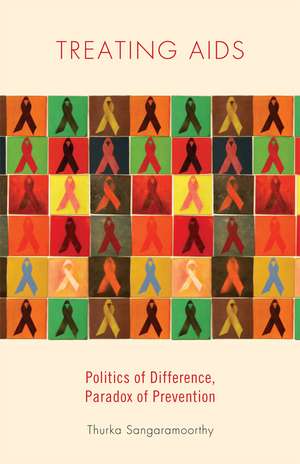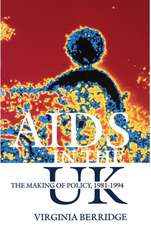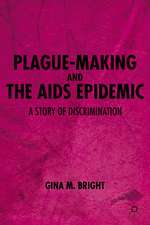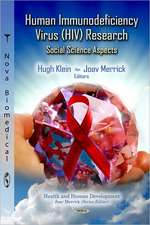Treating AIDS: Politics of Difference, Paradox of Prevention
Autor Thurka Sangaramoorthyen Limba Engleză Hardback – 26 mar 2014
There is an inherently powerful and complex paradox underlying HIV/AIDS prevention—between the focus on collective advocacy mobilized to combat global HIV/AIDS and the staggeringly disproportionate rates of HIV/AIDS in many places. In Treating AIDS, Thurka Sangaramoorthy examines the everyday practices of HIV/AIDS prevention in the United States from the perspective of AIDS experts and Haitian immigrants in South Florida. Although there is worldwide emphasis on the universality of HIV/AIDS as a social, political, economic, and biomedical problem, developments in HIV/AIDS prevention are rooted in and focused exclusively on disparities in HIV/AIDS morbidity and mortality framed through the rubric of race, ethnicity, and nationality. Everyone is at equal risk for contracting HIV/AIDS, Sangaramoorthy notes, but the ways in which people experience and manage that risk—and the disease itself—is highly dependent on race, ethnic identity, sexuality, gender, immigration status, and other notions of “difference.”
Sangaramoorthy documents in detail the work of AIDS prevention programs and their effect on the health and well-being of Haitians, a transnational community long plagued by the stigma of being stereotyped in public discourse as disease carriers. By tracing the ways in which public knowledge of AIDS prevention science circulates from sites of surveillance and regulation, to various clinics and hospitals, to the social worlds embraced by this immigrant community, she ultimately demonstrates the ways in which AIDS prevention programs help to reinforce categories of individual and collective difference, and how they continue to sustain the persistent and pernicious idea of race and ethnicity as risk factors for the disease.
Sangaramoorthy documents in detail the work of AIDS prevention programs and their effect on the health and well-being of Haitians, a transnational community long plagued by the stigma of being stereotyped in public discourse as disease carriers. By tracing the ways in which public knowledge of AIDS prevention science circulates from sites of surveillance and regulation, to various clinics and hospitals, to the social worlds embraced by this immigrant community, she ultimately demonstrates the ways in which AIDS prevention programs help to reinforce categories of individual and collective difference, and how they continue to sustain the persistent and pernicious idea of race and ethnicity as risk factors for the disease.
Preț: 393.36 lei
Nou
Puncte Express: 590
Preț estimativ în valută:
75.27€ • 78.80$ • 62.28£
75.27€ • 78.80$ • 62.28£
Carte tipărită la comandă
Livrare economică 05-19 aprilie
Preluare comenzi: 021 569.72.76
Specificații
ISBN-13: 9780813563732
ISBN-10: 0813563739
Pagini: 192
Ilustrații: 5 illustrations, 2 tables
Dimensiuni: 152 x 229 x 18 mm
Greutate: 0.4 kg
Ediția:None
Editura: Rutgers University Press
Colecția Rutgers University Press
ISBN-10: 0813563739
Pagini: 192
Ilustrații: 5 illustrations, 2 tables
Dimensiuni: 152 x 229 x 18 mm
Greutate: 0.4 kg
Ediția:None
Editura: Rutgers University Press
Colecția Rutgers University Press
Notă biografică
THURKA SANGARAMOORTHY is an assistant professor in the department of anthropology at the University of Maryland at College Park.
Cuprins
List of Figures and Tables
Acknowledgments
1. Treating Us, Treating Them
2. Treating the Numbers: HIV/AIDS Surveillance, Subjectivity, and Risk
3. Treating Culture: The Making of Experts and Communities
4. Treating Citizens: The Promise of Positive Living
5. Treating the Nation: Health Disparities and the Politics of Difference
6. Treating the West: Afterthoughts on Future Directions
Notes
References
Index
Acknowledgments
1. Treating Us, Treating Them
2. Treating the Numbers: HIV/AIDS Surveillance, Subjectivity, and Risk
3. Treating Culture: The Making of Experts and Communities
4. Treating Citizens: The Promise of Positive Living
5. Treating the Nation: Health Disparities and the Politics of Difference
6. Treating the West: Afterthoughts on Future Directions
Notes
References
Index
Recenzii
"As powerfully as Paul Farmer began the story of the stigmatization of Haitian Americans vis-à-vis HIV/AIDS, Sangaramoorthy reveals how the racialization of Haitians continues to be inscribed in a viral idiom. In this beautifully written account that will engage multiple audiences, constraints on how bodies can be voiced generate novel and unsettling insights that push the boundaries of medical anthropology and public health and reveal a frightening dimension of Miami’s status as a global city."
"Sangaramoorthy’s precise and compelling book makes an excellent intervention into medical anthropology, particularly immigrant health, HIV/AIDS research, health disparities, and theories on the production and calculation of risk."
"Sangaramoorthy, a medical anthropologist with a master's degree in public health, presents the results of ethnographic research on HIV/AIDs prevention initiatives and Haitian immigrants in Miami. A central argument, one that challenges public health's reliance on socially constructed categories of difference, is well made and crucial. The use of ethnography to explore both HIV/AIDS surveillance and prevention are novel, thought-provoking topics, as these areas are more often addressed through quantitative research methods. This book will make a fine addition to health determinants and health disparities curricula, and is even accessible to advanced undergraduates. Highly recommended."
Descriere
In Treating AIDS, Thurka Sangaramoorthy examines the everyday practices of HIV/AIDS prevention in the United States from the perspective of AIDS experts and Haitian immigrants in south Florida. Using in-depth ethnographic data, she underscores the difference between the global response to this public health crisis—where everyone is implicated as a potential carrier of risk—and the uncontested existence of racial and ethnic disparities in HIV/AIDS rates, access to treatment and care, and, especially, the stigma borne by carriers of the disease.














